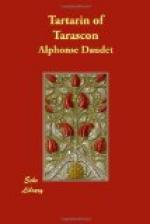Tartarin, however, showed no sign of leaving for Africa... did he really have any intention of going? That is a delicate question and one to which his biographer would find difficulty in replying. The fact is that the menagerie had now been gone for three months but the killer of lions had not budged... could it be that our innocent hero, blinded perhaps by a new mirage, honestly believed that he had been to Africa, and by talking so much about his hunting expedition believed that it had actually taken place. Unfortunately, if this was the case and Tartarin had once more fallen victim to the mirage, the people of Tarascon had not. When it was observed that after three months of waiting the hunter had not packed a single bag, people began to talk.
“This will turn out to be another Shanghai.” Said Costecalde, smiling, and this remark spread round the town like wildfire, for people had lost their belief in Tartarin. The ignorant, the chicken-hearted, people like Bezuquet, whom a flea could put to flight, and who could not fire a gun without closing both eyes, these above all were pitiless. At the club, on the esplanade, they accosted poor Tartarin with little mocking remarks, “Et autremain, what about this trip then?” At Costecalde’s shop his opinion was no longer law. The hat hunters had deserted their leader.
Then there were the epigrams. President Ladeveze who in his spare time dabbled in provencal poetry, composed a little song in dialect which was a great success. It concerned a certain hunter named master Gervaise whose redoubtable rifle was to exterminate every last lion in Africa. Sadly this rifle had a singular fault, although always loaded it never went off.... It never went off... you will understand the allusion. This song achieved instant popularity, and when Tartarin was passing, the stevedores on the quay and the grubby urchins hanging round his door would chant this insulting little ditty... only they sang it from a safe distance because of the double muscles.
The great man himself pretended to see nothing, to hear nothing. Although at heart this underhand, venomous campaign hurt him deeply, in spite of his suffering, he continued to go about his life with a smile; but sometimes the mask of cheerful indifference which pride had pinned on his features slipped, then instead of laughter one saw indignation and grief. So it was one morning when some street urchins were chanting their jeers beneath the window of the room where our poor hero was trimming his beard. Suddenly the window was thrown open and Tartarin’s head appeared, his face covered in soapsuds, waving a razor and shaving brush and shouting “Sword-thrusts, gentlemen, sword-thrusts, not pin-pricks!” Fine words but wasted on a bunch of brats about two bricks tall.
Amid the general defection, the army alone stood firmly by Tartarin, the brave Commandant Bravida continued to treat him with esteem. “He’s a stout fellow,” He persisted in saying, and this affirmation was worth a good deal more, I should imagine, than anything said by Bezuquet the chemist.




